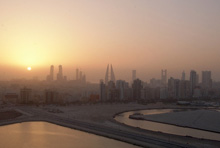
Bahrain’s architecture is comparable to its art and fashion — contemporary and cutting-edge. Bahrain’s skyline shows several of the buildings unique only to Bahrain, including the Four Season’s hotel, World Trade Center, and Al Fateh Grand Mosque.
Bahrain’s island location has made it unique among Persian Gulf states. With greater access to ocean travel and broader exposure to outside influences, Bahrain traditionally has been home to a more ethnically and religiously diverse and cosmopolitan population than have other, more insular gulf states. This openness is reflected in Bahrain’s social customs, which, although still conservative, are much more moderate and relaxed than those of its neighbors, particularly conservative Saudi Arabia. Although Bahrain is still an Arab-Islamic country at heart, it has been more accepting of modernization and Westernization than many of its neighbors.
Only 1 percent of Bahrain is arable, so the country relies almost entirely on imports. The economy is based largely on petroleum production and processing, which account for 60 percent of exports and 30 percent of the gross domestic product (GDP). Bahrain also has well-developed communications and transportation, which has allowed it to become a center for banking and finance, and is the headquarters for a number of multinational firms that do business in the Persian Gulf area.
The country produces fruits and vegetables, poultry, dairy products, shrimp, and fish that are sold in the souks, along with locally produced handicrafts. Tourism is a growing business and a good deal of international banking is conducted in Bahrain.
To learn more about modern Bahrain, please visit:
U.S. Dept. of State – U.S. Relations with Bahrain
Encyclopedia Britannica
CIA World Factbook – Bahrain
Quora – What is it like living in Bahrain?